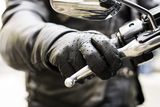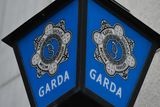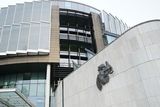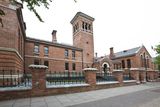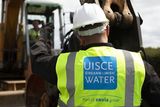A giant of Irish athletics – Olympic marathon runner Jerry Kiernan leaves a rich legacy behind
Jerry Kiernan, winner of the 1992 Dublin Marathon, 26 October 1992. Photo: Ray McManus/ Sportsfile
Irish athletics has lost another giant with the death of Jerry Kiernan, who leaves behind a legacy as one of Ireland’s foremost distance runners and coaches.
The 67-year-old was a native of Listowel, Co Kerry, and he lived in Dublin for most of his adult life.
He had many achievements in the course of his career. He finished in ninth place in the marathon at the 1984 Olympics in Los Angeles, where his Irish teammate John Treacy won the silver medal.
Mr Kiernan won the Dublin Marathon in 1982 and 1992 and in 1976 he became the seventh Irishman to break the four-minute mile when he ran 3:59.2 in London.
A retired national school teacher, he coached middle-distance runners Joe Sweeney and Ciara Mageean.
A life member of Clonliffe Harriers AC, he was a respected athletics analyst on RTÉ television for many years. During an athletic career that spanned three decades, he was one of the country’s most versatile performers on track, road and cross-country. But it wasn’t until he switched to the marathon at the age of 29 that he achieved international success.
He first showed his potential at underage level, winning the Irish junior 1500m and cross-country titles in the early 1970s.
After securing a post as a teacher in St Brigid’s Boys school in Foxrock in south Dublin, Mr Kiernan linked up with Clonliffe Harriers. Initially his career blossomed on the track and he won the Irish 1500m title in 1975.
As well as breaking the four-minute barrier in June 1976, he also set a new personal best for the 1500m of 3:41.90 in Dusseldorf 11 days earlier.
A year later he became the first Irish athlete to dip under eight minutes for the 3,000m. At the old Crystal Palace stadium in London, he ran 7:56.9 for the distance, smashing Tom O’Riordan’s 11-year-old Irish record.
Even though he missed out on qualification for major championships, he won the Irish 10,000m track title in 1981, having won the National Inter-counties Cross-Country title earlier in the season.
By then an increasing number of established track runners had switched their attention to road racing following the first Dublin Marathon in 1980 and the establishment of the Business Houses Athletic Association (BHAA).
Mr Kieran, together with the Hooper brothers, Dick and Pat, played a pivotal role in establishing the BHAA, which helped heal the damaging split in Irish athletics by defying Bord Luthchleas na hEireann (BLE) and taking part in races organised under the BHAA banner.
Two of his biggest rivals, Dick Hooper and Boston marathon winner Neil Cusack, had won the first two Dublin Marathons in 1980 and 1981. Mr Kieran opted to make his debut over the classic distance in the 1982 race, which was televised live for the first time.
At the 15-mile mark, he was on target to smash the Irish record. But he slowed dramatically over the final six miles and was forced to stop three times. Encouraged by Eamon Coghlan, he got going again and won in a record time of 2:13.45.
During the remainder of his career, he concentrated on road races and cross-country.
He represented Ireland in seven World Cross-Country Championships and won the Irish inter-club title in 1984. He was a member of the Clonliffe Harriers squad that dominated the national cross-country team events, winning the blue riband prize on an extraordinary eight occasions.
In 1984 he was sensationally disqualified after winning the Cork Marathon which doubled as the BLE National Championship.
The winner of the women’s race, Deirdre Nagle, was also disqualified as BLE deemed the vests they wore were illegal. But together with Dick Hooper and John Treacy, Mr Kiernan was selected to represent Ireland in the marathon at the LA Olympics. He secured a magnificent ninth place in a personal-best time of 2:12.20.
A decade after his first Dublin Marathon he won the event again in 1992 at the age of 39 in a time of 2:17.19. In total he won 17 senior caps for Ireland.
Join the Irish Independent WhatsApp channel
Stay up to date with all the latest news
